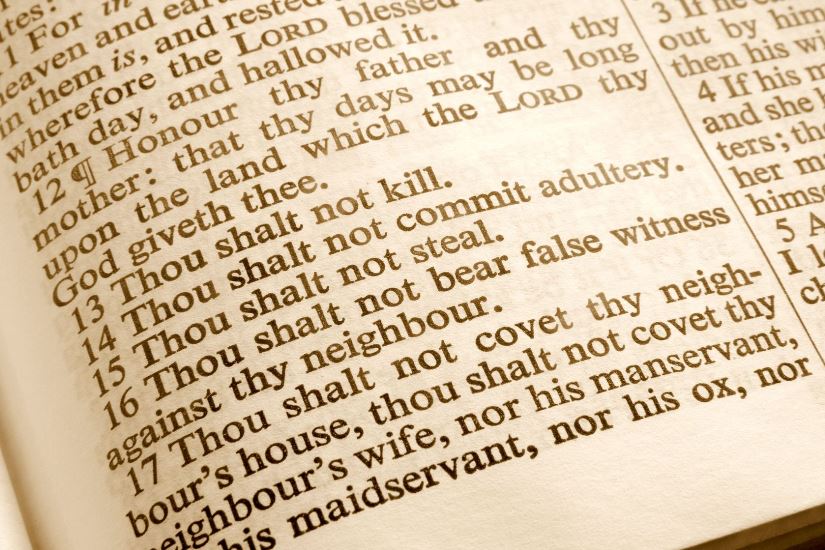In the Fourth Century, Hilary, Bishop of Poitiers, continued the tradition of counting the books of the Old Testament canon in accordance with the Hebrew alphabet, i. e., twenty-two. He enumerated them in his
Prologo in Psalmos: "Five of Moses; Joshua the son of Nun, the sixth; Judges and Ruth, the seventh; first and second Kings [what we call "Samuel"], the eighth; third and fourth Kings, the ninth; two books of Chronicles, the tenth; Ezra, the eleventh; Psalms, the twelfth; Ecclesiastes and Canticles, the thirteenth, fourteenth, and fifteenth [sic, Proverbs dropped by a copyist]; the Twelve Prophets, the sixteenth; then Isaiah and Jeremiah, together with his Lamentations and his epistle; Daniel and Ezekiel; and Job and Esther make up the full number of twenty-two books."
In the same time period, Cyril of Jerusalem was even more forceful: "Learn diligently from the Church what are the books of the Old Testament and what of the New, but
read me none of the Apocryphal; for, if you do not know the books acknowledged by all, why do you vainly trouble yourself about the
disputed books? Read, then, the divine Scriptures, the twenty-two books of the Old Testament, which have been translated by the seventy-two interpreters [i. e., of the Septuagint]. Of the Law first are the five books of Moses, then Jesus the son of Nave [Greek for Joshua the son of Nun], and the book of Judges with Ruth, which is numbered the seventh; then follow other historical books, the first and second of the Kingdoms [i. e., Samuel]; the third and fourth are also one book [i. e., the books of Kings]; the first and second of Chronicles are, in like manner, reckoned as one book; the twelfth is Esther. These are the historical books. The books written in verse are five - Job and the book of Psalms, Proverbs, Ecclesiastes, and the Song of Songs - making the seventeenth book. After these are the five prophetical books - one of the Twelve Prophets, one of Isaiah, one of Jeremiah, with Baruch, Lamentations, and an Epistle; then Ezekiel and the book of Daniel, the twenty-second book of the Old Testament" (emphasis added).
And in that same century, Epiphanius of Salamis wrote, "Twenty-seven books, acknowledged and received into the Old Testament, which, according to the letters of the Hebrew alphabet, are counted as twenty-two, have been interpreted... [The Jews] enumerate their books as twenty-two, though in reality twenty-seven; for the book of Ruth is joined to the book of Judges, and the two are counted as one by the Hebrews. The first and second Kings [i. e., Samuel] are also counted as one book, and in like manner the third and fourth of Kings are reckoned as one. And in this way all the books of the Old Testament are comprehended in five pentateuchs, with two other books not included in these divisions. Five pertain to the law: Genesis, Exodus, Leviticus, Numbers, Deuteronomy... Five are poetical: Job, Psalms, Proverbs of Solomon, Ecclesiastes, and Canticles. Then another pentateuch embraces the Hagiographa: Joshua, Judges and Ruth, first and second Chronicles, first and second Kings [Samuel], and third and fourth of Kings. This is the third pentateuch. Another pentateuch contains the Twelve Prophets, Isaiah, Jeremiah, Ezekiel, and Daniel. Besides these there remain the two books of Ezra [i. e., Ezra with Nehemiah], which are counted as one, and the book of Esther. In this way, the twenty-two books are made out according to the number of the Hebrew letters."
And finally, let me quote Gregory of Nazianzus: "There are twelve historical books of the most ancient Hebrew wisdom: the first Genesis; then Exodus, Leviticus, Numbers, Deuteronomy; the next Joshua, the Judges, Ruth, the eighth; ninth and tenth the acts of the Kings [i. e., I and II Samuel and I and II Kings], and then the Remains [i. e., Chronicles], and Esdras the last [i. e., Ezra and Nehemiah]. Then the five books of verse, the first Job, next David [i. e., Psalms], then the three books of Solomon: Ecclesiastes, the Song, and Proverbs. The prophetic books are five: the Twelve Prophets are one book, Hosea, Amos, Micah, Joel, Jonah, Obadiah, Nahum, Habakkuk, Haggai, Zechariah, Malachi, all these make one book; the second is Isaiah, then Jeremiah, Ezekiel, and Daniel; which make twenty-two books, according to the number of the Hebrew letters." That he refers to the Twelve prophets, and then lists only eleven probably indicates a copyist error in dropping Zephaniah, likely because of its similarity to the name Zechariah.

















